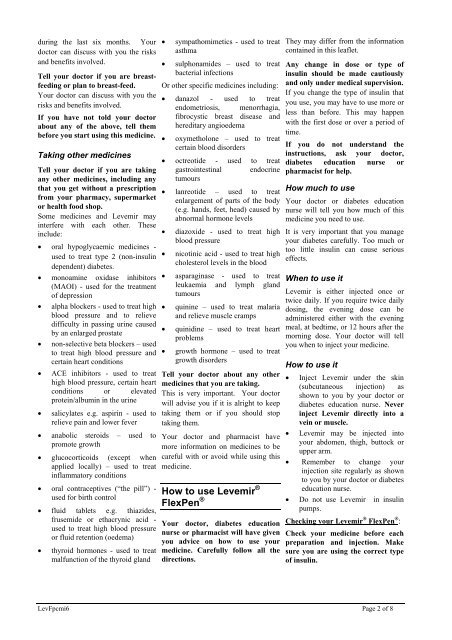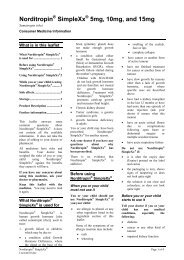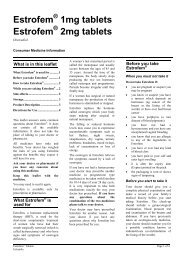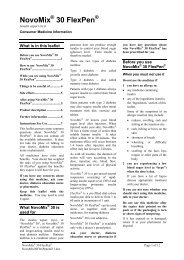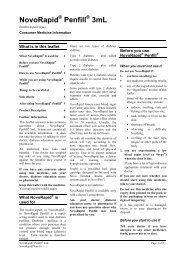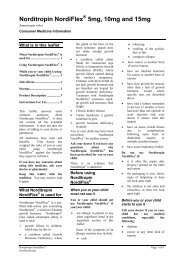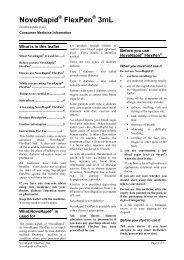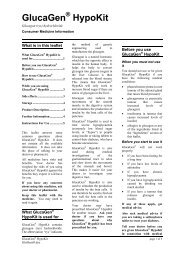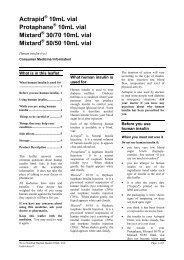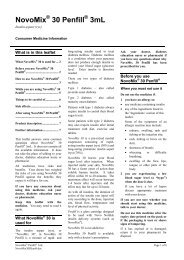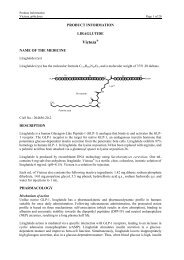Levemir FlexPen - Novo Nordisk Australasia
Levemir FlexPen - Novo Nordisk Australasia
Levemir FlexPen - Novo Nordisk Australasia
Create successful ePaper yourself
Turn your PDF publications into a flip-book with our unique Google optimized e-Paper software.
during the last six months. Your<br />
doctor can discuss with you the risks<br />
and benefits involved.<br />
Tell your doctor if you are breastfeeding<br />
or plan to breast-feed.<br />
Your doctor can discuss with you the<br />
risks and benefits involved.<br />
If you have not told your doctor<br />
about any of the above, tell them<br />
before you start using this medicine.<br />
Taking other medicines<br />
Tell your doctor if you are taking<br />
any other medicines, including any<br />
that you get without a prescription<br />
from your pharmacy, supermarket<br />
or health food shop.<br />
Some medicines and <strong>Levemir</strong> may<br />
interfere with each other. These<br />
include:<br />
• oral hypoglycaemic medicines -<br />
used to treat type 2 (non-insulin<br />
dependent) diabetes.<br />
• monoamine oxidase inhibitors<br />
(MAOI) - used for the treatment<br />
of depression<br />
• alpha blockers - used to treat high<br />
blood pressure and to relieve<br />
difficulty in passing urine caused<br />
by an enlarged prostate<br />
• non-selective beta blockers – used<br />
to treat high blood pressure and<br />
certain heart conditions<br />
• ACE inhibitors - used to treat<br />
high blood pressure, certain heart<br />
conditions or elevated<br />
protein/albumin in the urine<br />
• salicylates e.g. aspirin - used to<br />
relieve pain and lower fever<br />
• anabolic steroids – used to<br />
promote growth<br />
• glucocorticoids (except when<br />
applied locally) – used to treat<br />
inflammatory conditions<br />
• oral contraceptives (“the pill”) -<br />
used for birth control<br />
• fluid tablets e.g. thiazides,<br />
frusemide or ethacrynic acid -<br />
used to treat high blood pressure<br />
or fluid retention (oedema)<br />
• thyroid hormones - used to treat<br />
malfunction of the thyroid gland<br />
• sympathomimetics - used to treat<br />
asthma<br />
• sulphonamides – used to treat<br />
bacterial infections<br />
Or other specific medicines including:<br />
• danazol - used to treat<br />
endometriosis, menorrhagia,<br />
fibrocystic breast disease and<br />
hereditary angioedema<br />
• oxymetholone – used to treat<br />
certain blood disorders<br />
Tell your doctor about any other<br />
medicines that you are taking.<br />
This is very important. Your doctor<br />
will advise you if it is alright to keep<br />
taking them or if you should stop<br />
taking them.<br />
Your doctor and pharmacist have<br />
more information on medicines to be<br />
careful with or avoid while using this<br />
medicine.<br />
How to use <strong>Levemir</strong> ®<br />
<strong>FlexPen</strong> ®<br />
Your doctor, diabetes education<br />
nurse or pharmacist will have given<br />
you advice on how to use your<br />
medicine. Carefully follow all the<br />
directions.<br />
They may differ from the information<br />
contained in this leaflet.<br />
Any change in dose or type of<br />
insulin should be made cautiously<br />
and only under medical supervision.<br />
If you change the type of insulin that<br />
you use, you may have to use more or<br />
less than before. This may happen<br />
with the first dose or over a period of<br />
time.<br />
If you do not understand the<br />
instructions, ask your doctor,<br />
diabetes education nurse or<br />
pharmacist for help.<br />
• octreotide - used to treat<br />
gastrointestinal endocrine<br />
tumours<br />
• lanreotide – used to treat How much to use<br />
enlargement of parts of the body<br />
(e.g. hands, feet, head) caused by<br />
abnormal hormone levels<br />
• diazoxide - used to treat high<br />
blood pressure<br />
• nicotinic acid - used to treat high<br />
cholesterol levels in the blood<br />
• asparaginase - used to treat When to use it<br />
leukaemia and lymph gland<br />
tumours<br />
• quinine – used to treat malaria<br />
and relieve muscle cramps<br />
• quinidine – used to treat heart<br />
problems<br />
• growth hormone – used to treat<br />
growth disorders<br />
How to use it<br />
Your doctor or diabetes education<br />
nurse will tell you how much of this<br />
medicine you need to use.<br />
It is very important that you manage<br />
your diabetes carefully. Too much or<br />
too little insulin can cause serious<br />
effects.<br />
<strong>Levemir</strong> is either injected once or<br />
twice daily. If you require twice daily<br />
dosing, the evening dose can be<br />
administered either with the evening<br />
meal, at bedtime, or 12 hours after the<br />
morning dose. Your doctor will tell<br />
you when to inject your medicine.<br />
• Inject <strong>Levemir</strong> under the skin<br />
(subcutaneous injection) as<br />
shown to you by your doctor or<br />
diabetes education nurse. Never<br />
inject <strong>Levemir</strong> directly into a<br />
vein or muscle.<br />
• <strong>Levemir</strong> may be injected into<br />
your abdomen, thigh, buttock or<br />
upper arm.<br />
• Remember to change your<br />
injection site regularly as shown<br />
to you by your doctor or diabetes<br />
education nurse.<br />
• Do not use <strong>Levemir</strong> in insulin<br />
pumps.<br />
Checking your <strong>Levemir</strong> ® <strong>FlexPen</strong> ® :<br />
Check your medicine before each<br />
preparation and injection. Make<br />
sure you are using the correct type<br />
of insulin.<br />
LevFpcmi6 Page 2 of 8


